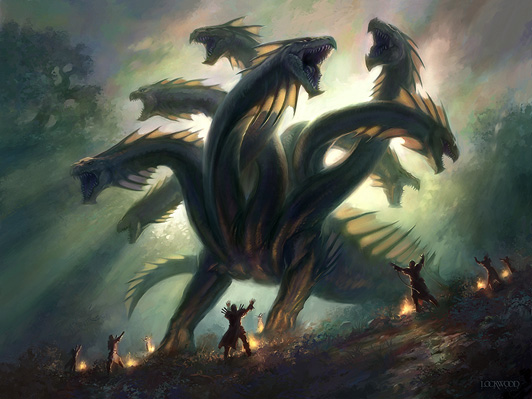

Though the monster shrieked in pain, the injuries were far from life-threatening.

He began cutting off the Hydra's heads as fast as he could. After a few areas, the Hydra charged out of the cave, ready to tear its assailant to shreds. He crept to the cave around the Spring of Amymone, where the monster slept, and shot fiery arrows into it. Heracles entered the Lernaean swamp with his mouth and nose covered in thick fabric, so that he wouldn't breathe the monster's poisonous scent. Sure enough, slaying the Hydra became one of Heracles twelve tasks, much to Hera's delight. She adopted the Hydra and began training it to be one of Greek's most fearsome monsters -A monster that would be almost impossible to kill. When an oracle told Heracles that, to gain immortality, he must complete twelve impossible tasks, Hera saw a golden opportunity to get rid of the boy once and for all. As she watched the golden boy grow into a young Greek hero, she grew angrier and angrier still. But even that punishment wasn't enough for Hera. Shortly after Heracles was born, Hera found out about Zeus's infidelity and demanded that he banish his son from Mt. the Hydra Heracles was the son of Zeus, but he wasn't the son of Zeus's wife, Hera. He only managed to kill it with the help of his quick-witted nephew, Iolaus. When Heracles finally encountered the Hydra, all Hera's training was put to the test. She raised the creature with the intent of using it to destroy Heracles - finding a home for it, protecting it from harm, and nurturing its destructive impulses. Hera, wife of Zeus, adopted the Hydra when it was a baby. Together, they gave the Hydra its immortality, monstrous shape, and evil disposition. Related Characters The Hydra was the offspring of Greek's two earliest monsters: Typhon, an immortal giant, and Echidna, half-woman and half-snake. The beast could only be killed by cutting off the immortal head - a near impossible text. If any of the mortal heads were cut off, two or more heads would sprout from the monster's body to replace the loss. The monster had one, immortal head, which was protected by the other, deadly heads that grew around it. Second, the Hydra was immortal and had regenerative abilities. Even after the Hydra was slaughtered, its blood was used as a weapon that brought down many strong fighters. Some men died simply from approaching the beast's lair and smelling its poisonous blood and breath.
#Hydra greek mythology full#
First, the Hydra's blood was full of super-toxic poison. This monster had powers that could easily send a hero to the underworld. Special Abilities It's no mistake that Hera chose the Hydra as one of Heracle's Eleven Tasks. Only hunger or rage could draw the beast out of its lair otherwise, it was mindless and lazy. When the Hydra wasn't filling its stomach with human flesh, it slumbered in a deep swamp cave (which was rumored to be one of the entrances to the underworld). It ravaged innocent villages around its home, Lake Lerna, devouring hundreds of victims. From birth, the goddess Hera trained the monster to attack and destroy anything that fell beneath its gaze. Personality The Hydra had a nasty personality to match its horrid appearance. Some show the tail forking at the end into two or more small tails. Eventually, all those necks welded together into a fat tail, which trailed along the ground behind the monster. Not only was this swamp-dwelling monster larger than any known snake, it had somewhere between six and one hundred heads! Each of the Hydra's heads was supported by a long neck, so the heads could coil around each other or fan out and attack challengers from every angle. Characteristics Physical Description The Hydra was literally multiple times more ferocious than its closest relative: the snake. Although the monster claimed hundreds of victims, it is most famous for its battle with the hero Heracles. What is the Hydra? The Hydra is an immortal, many-headed snake who haunted the swamps around Lake Lerna in ancient Greece.


 0 kommentar(er)
0 kommentar(er)
